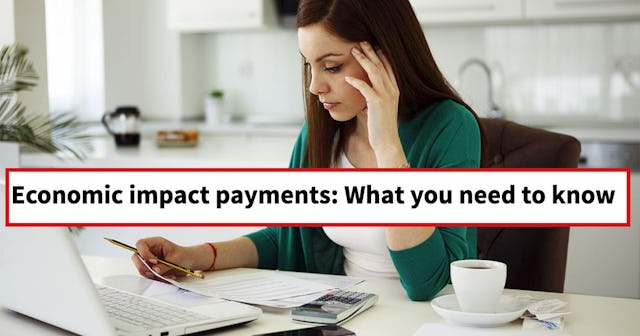What You Need To Know About Coronavirus Stimulus Checks

Here is everything you need to know about coronavirus impact payments, courtesy of the Internal Revenue Service
With the unemployment rate skyrocketing and the economy suffering due to the novel coronavirus pandemic, many people in the United States are relying on the Federal government for financial reprieve. On March 27, President Donald Trump signed the historic $2 trillion stimulus package in order to help the economy and the American people survive the financial impact of the health crisis. In addition to helping out businesses, a huge part of the plan involves the distribution of funds to individuals who qualify. If you happen to fall into that category — or if you aren’t sure if you do — you likely have a lot of questions, including when and how you will receive the funds and whether you need to do anything to get them. Luckily, the Internal Revenue Service has answered many of them.
In a March 30 release, the IRS explained that the distribution of economic impact payments will begin in the next three weeks, “automatically, with no action required for most people,” they explained. “However, some taxpayers who typically do not file returns will need to submit a simple tax return to receive the economic impact payment.”
But first of all, who is even eligible for the economic impact payment? According to the IRS, tax filers with adjusted gross income up to $75,000 for individuals and up to $150,000 for married couples filing joint returns will receive the full payment. In case you are curious, adjusted gross income is defined as “gross income minus adjustments to income.” For example, it includes your wages, dividends, capital gains, business income, retirement distributions with adjustment including such items as Educator expenses, Student loan interest, Alimony payments, or contributions to a retirement account.
For filers who earn over those amounts, the payment amount will be reduced by $5 for each $100 above the $75,000/$150,000 thresholds. As for single filers with income over $99,000 and $198,000 for joint filers with no children, they will not be eligible. Additionally, “Social Security recipients and railroad retirees who are otherwise not required to file a tax return are also eligible and will not be required to file a return.”
If you are an eligible taxpayer who filed tax returns for either 2019 or 2018, you will automatically receive an economic impact payment of up to $1,200 for individuals or $2,400 for married couples, as well as up to $500 for each qualifying child.
They reiterate: “The vast majority of people do not need to take any action. The IRS will calculate and automatically send the economic impact payment to those eligible.” If you have already filed your 2019 tax return, that will be used to calculate your payment. If not, they will use the information from your 2018 return.
How will you get the money? The IRS explains that they money will be deposited directly into the same banking account reflected on the return filed. If the bank doesn’t have your direct deposit information, sit tight. “In the coming weeks, Treasury plans to develop a web-based portal for individuals to provide their banking information to the IRS online, so that individuals can receive payments immediately as opposed to checks in the mail,” they continue.
Okay, so you are not typically required to file a tax return. You can still get your payment. “The IRS will use the information on the Form SSA-1099 or Form RRB-1099 to generate Economic Impact Payments to recipients of benefits reflected in the Form SSA-1099 or Form RRB-1099 who are not required to file a tax return and did not file a return for 2018 or 2019,” they explain. “This includes senior citizens, Social Security recipients and railroad retirees who are not otherwise required to file a tax return.”
Also for those who have a tax filing obligation but have not filed their tax return for 2018 or 2019, they too can get a check. “The IRS urges anyone with a tax filing obligation who has not yet filed a tax return for 2018 or 2019 to file as soon as they can to receive an economic impact payment,” they explain, “Taxpayers should include direct deposit banking information on the return.”
One more important piece of information, is that if you still need to file a return in order to get a check, you have the rest of 2020 to do so.
This article was originally published on